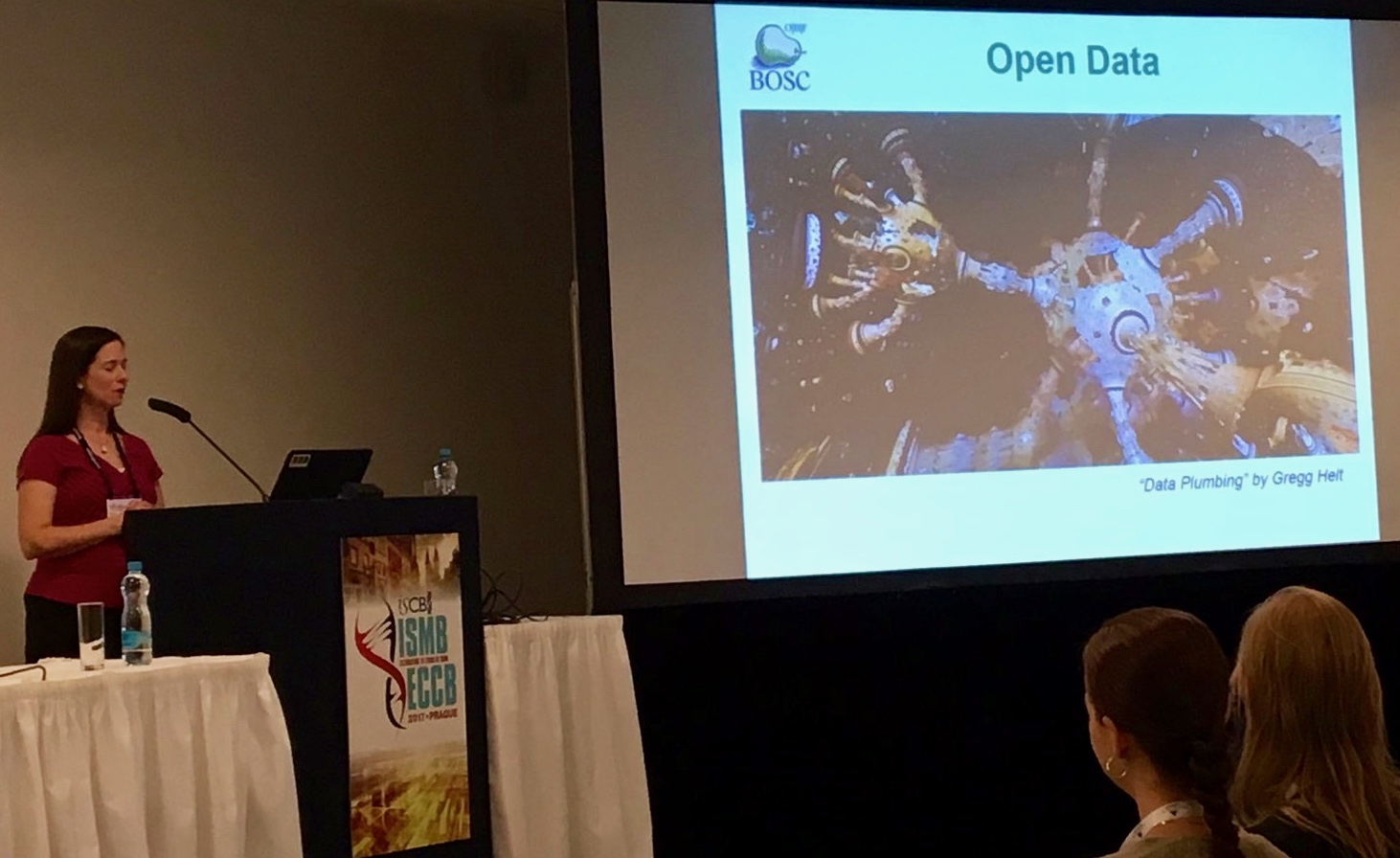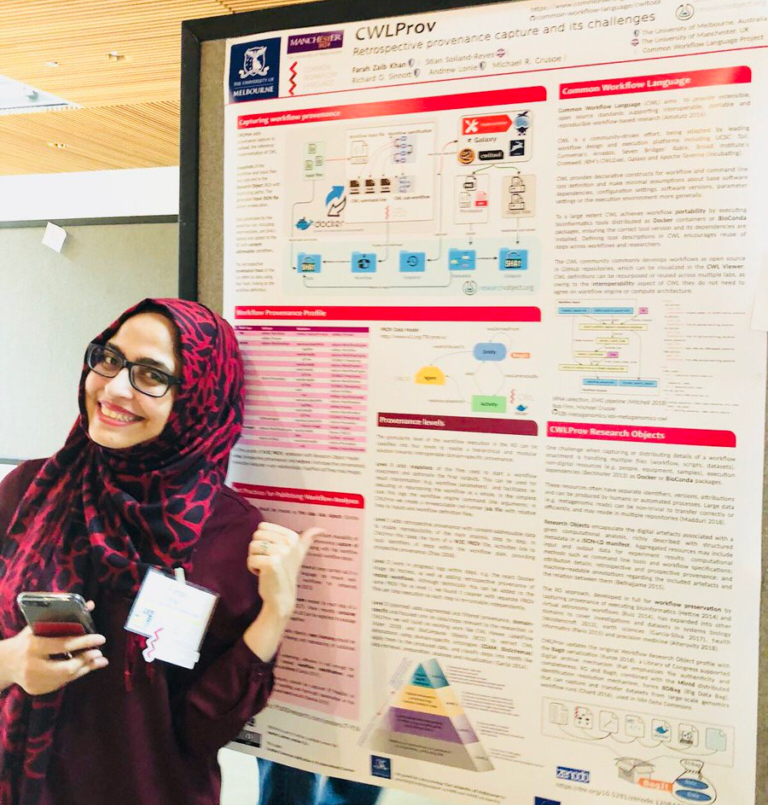Note: This is a guest blog post from Angela Muraya, who was supported by the ongoing Open Bioinformatics Foundation travel fellowship program to attend the Africa Open Science Hardware Summit 2019. The OBF’s Travel Fellowship program continues to help open source bioinformatics software developers with funding to attend conferences or workshops. If you are hoping to attend an open source / open science bioinformatics event and travel costs are a barrier, we encourage you to apply for one of our $1000 travel fellowships . The next deadline is August 15, 2019.
[Read More]Travel Award Recipients For April 2019
We are pleased to announce the April 2019 OBF Travel Fellowship recipients. The OBF Travel Fellowship program, established in 2016, aims to increase diverse participation at events related to open source bioinformatics. After carefully evaluating a competitive set of applications submitted from all around the globe, we were able to extend offers to five deserving applicants: Sara El-Gebali, Angela Wanjugu Muraya, Saket Choudhary, Aziz Khan and Vid Ayer. They have all accepted the award, and we are looking forward to hearing about their experiences.
[Read More]BOSC late-round abstract submission closes May 15!
 If you’d like the opportunity to present your work at BOSC 2019 (which will take place in Basel, Switzerland, on July 24-25, the last two days of ISMB/ECCB 2019), now’s your chance! The late round of abstract submission is open, and we will be choosing a few abstracts for “Late-Breaking Lightning Talks” as well as posters.
If you’d like the opportunity to present your work at BOSC 2019 (which will take place in Basel, Switzerland, on July 24-25, the last two days of ISMB/ECCB 2019), now’s your chance! The late round of abstract submission is open, and we will be choosing a few abstracts for “Late-Breaking Lightning Talks” as well as posters.
BOSC welcomes submissions about all aspects of open source bioinformatics, open science and open data. More information, and a link to the EasyChair submission portal, can be found at /events/bosc/submit/ .
[Read More]Goodbye mediawiki, hello new website!
Above: the old BOSC page. Below: the new one.
If you’ve been around the OBF and BOSC community, you’re probably familiar with our slightly rusty old site, which ran on MediaWiki, the same open source software that runs Wikipedia. While they’re both awesome tools, we decided it was time for a refresh.
Over the last few months, our Outreachy Intern Deepashree Deshmukh designed and implemented the new OBF website(with supervision by OBF Board member Yo Yehudi). The goal was an attractive and easily-updatable site that can function as a community-oriented hub. Did we accomplish that? Your feedback on the new site is welcome!
[Read More]2nd US Semantic Technology Symposium 2019
This is a guest blog post from Md Kamruzzaman Sarker, who was supported by the ongoing Open Bioinformatics Foundation travel fellowship program to attend 2nd U.S. Semantic Technologies Symposium Series (US2TS). The OBF’s Travel Fellowship program continues to help open source bioinformatics software developers with funding to attend conferences or workshops. The current call closes on 15 April 2019. If you are hoping to attend an open source / open science bioinformatics even and travel costs are a barrier, we encourage you to apply for one of our $1000 travel fellowships.
[Read More]A week of open source adventures in San Diego
This is a guest blog post from Lindsay Rutter, who was supported by the ongoing Open Bioinformatics Foundation travel fellowship program to attend a National Center for Biotechnology Information (NCBI) hackathon and the Plant and Animal Genome Conference (PAG). The OBF’s Travel Fellowship program continues to help open source bioinformatics software developers with funding to attend conferences or workshops. The current call closes on 15 April 2019. If you are hoping to attend an open source / open science bioinformatics even and travel costs are a barrier, we encourage you to apply for one of our $1000 travel fellowships.
[Read More]Google Summer of Code 2018 wrap-up
We have recently applied to Google for the OBF to be part of the Google Summer of Code 2019 programme, again with Kai Blin and Michael Crusoe as joint administrators. Last year, OBF GSoC 2018, was another good year with five students successfully completing their projects:
- Synchon Mandal (mentor Moritz Beber) “Adding methods to cobrapy for improved constraint-based metabolic modelling.” ( first blog bost; final report)
- Sophia Mersmann (mentors Oliver Alka, Julianus Pfeuffer, and Timo Sachsenberg) “Improve Posterior Error Probability Estimation For Peptide Search Engine Results” (blog posts; final report)
- Edgar Garriga Nogales (mentors Paolo Di Tommaso, Michael R. Crusoe, and Stian Soiland-Reyes) “Implement the support for Research Object specification into Nextflow framework” ( repository; homepage; final report).
- Sarthak Sehgal (mentors Yo Yehudi, Dennis Schwartz, and Rowland Mosbergen) “Frontend Website Student Project for BioJS” ( repository; blog posts; final report).
- Megh Thakkar (mentors Yo Yehudi, Dennis Schwartz, and Rowland Mosbergen) “Backend Website Student Project for BioJS” ( repository; blog posts; final report).
In some cases there isn’t a single code repository to link to, rather their work included pull requests to the main project etc.
[Read More]Travel award recipients for December 2018
We had a great round of OBF travel fellowship candidates in our last round of applications, and after review we extended offers to three deserving applicants: Malvika Sharan, Lindsay Rutter, and Sarker Kamruzzaman. They’ve all accepted the award, and we’re looking forward to hearing about their experiences!
Congratulations to our December 2018 recipients:
Malvika Sharan will be attending BOSC at ISMB 2019 in Basel this July. Abstract submissions have only just opened, but she intends to submit an abstract expanding on the idea “Inclusiveness in Open Science” that she spoke about last year ( slides). She’s been active in the BOSC community for several years, participating in abstract review and BoF organisation, and she plans to continue this for 2019.
[Read More]Meet our new Travel Fellowship Review Chair: Farah Zaib Khan
 Farah presents CWLProv at GCCBOSC 2018
Farah presents CWLProv at GCCBOSC 2018
The next round of our OBF Travel Fellowships just ended on the 15th of December! This round we have introduced a Review Chair coming from the midst of our community that will help us in reviewing the applications. The role will be filled by Farah Zaib Khan, one of our OBF Travel Fellowship alumni. Farah has successfully applied for the Fellowship twice before. Thanks in part to this support, she has become a central community member both of the Bioinformatics Open Source Conference and the Open Bioinformatics Foundation itself.
[Read More]Biopython 1.73 released
Dear Biopythoneers,
Biopython 1.73 has been released and is available from our website and PyPI.
This release of Biopython supports Python 2.7, 3.4, 3.5 and 3.6. It has also been tested on PyPy2.7 v6.0.0 and PyPy3.5 v6.0.0.
As in recent releases, more of our code is now explicitly available under either our original " Biopython License Agreement", or the very similar but more commonly used “3-Clause BSD License”. See the LICENSE.rst file for more details.
[Read More]